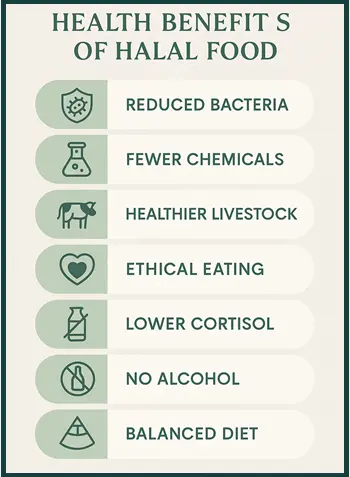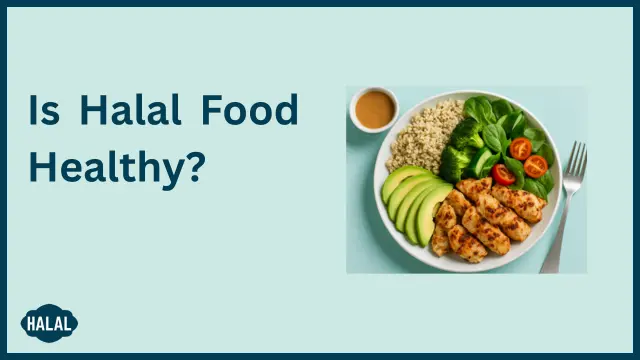Is Halal Food Healthy?
With the rise of conscious eating, many people—Muslims and non-Muslims alike—are exploring if religious dietary laws offer any health benefits. This leads to a popular question: Is halal food healthy?
In this blog, we’ll explore the nutritional and hygienic aspects of halal food, backed by science and references from the Qur’an and Hadith. You’ll learn how halal food isn’t just about faith—it also promotes wellness, cleanliness, and ethical living.
What is Halal Food?
Halal (Arabic: حلال) means “permissible” or “lawful” in Islam. It refers to anything allowed under Islamic law. When it comes to food, it includes:
- Permissible animals (e.g., chicken, beef, fish)
- Proper slaughtering method (Zabiha) invoking the name of Allah (SWT)
- No blood, pork, or alcohol
- No harmful additives or contamination
📖 Qur’an Reference:
“O mankind, eat from whatever is on earth [that is] lawful and good…”
(Surah Al-Baqarah, 2:168)
For more details read out What Makes the Meat Halal?
Is Halal Food Healthier Than Non-Halal?
Let’s explore why many consider halal food healthier—beyond the religious scope.
1. Clean and Humane Slaughter Process
- Animals are slaughtered swiftly, reducing pain and stress (which lowers harmful hormone release).
- Blood is fully drained, preventing bacterial growth and toxins.
- The animal must be healthy and well-treated before slaughter.
📖 Hadith Reference:
“Verily, Allah has prescribed excellence in everything. If you kill, kill well; and if you slaughter, slaughter well…”
(Sahih Muslim 1955)
2. No Harmful Additives or Intoxicants
- Halal food must be free from alcohol and harmful chemicals.
- Natural and pure ingredients are prioritized.
📖 Qur’an Reference:
“They ask you about wine and gambling. Say, ‘In them is great sin and [yet, some] benefit for people. But their sin is greater than their benefit…’”
(Surah Al-Baqarah 2:219)
3. Ethical Animal Treatment
- Halal emphasizes the well-being of animals, including feeding them clean food and avoiding cruelty.
Scientific Insights into Halal Practices
Recent research indicates that the halal slaughter method, which requires draining the blood, can lower microbial contamination in meat. A study published in the Journal of Food Safety and Hygiene (2022) reported that halal-slaughtered meat had significantly lower bacterial counts compared to conventional methods.
Additionally, halal regulations prohibit harmful additives, alcohol-based preservatives, and genetically modified ingredients unless verified safe. This aligns with clean-label food movements in modern nutrition science.
Nutritional Benefits of Common Halal Foods
| Food Type | Halal Example | Key Nutrients |
|---|---|---|
| Meats | Zabiha Chicken, Beef | Protein, Iron, B-vitamins |
| Dairy | Halal Yogurt, Milk | Calcium, Probiotics, Vitamin D |
| Plant-based | Lentils, Dates, Figs | Fiber, Antioxidants, Minerals |
| Spices & Herbs | Black seed, Zaatar | Anti-inflammatory, Digestive aid |
Quick Health Benefits of Eating Halal Food
✅ Reduced exposure to harmful bacteria (due to blood drainage)
✅ Lower risk of consuming processed additives or chemicals
✅ Better animal welfare = healthier meat
✅ Ethical and conscious food consumption
✅ Less stress hormone content in meat (due to humane slaughter)
✅ Avoidance of intoxicants like alcohol in sauces, marinades, etc.
✅ Encouragement of moderation in diet (per Islamic teachings)

Myths & Misconceptions Around Halal Food
❌ Myth: Halal food is only for Muslims
✔️ Truth: Halal food is ethically clean and many non-Muslims prefer it for its hygienic and humane values.
❌ Myth: Halal meat is unregulated
✔️ Truth: Many halal certification authorities follow strict inspection protocols for cleanliness and religious compliance.
Tips for Choosing Healthy Halal Options
- Look for certified halal labels
- Choose organic or grass-fed halal meats
- Cook with healthy oils (olive, coconut)
- Avoid processed or deep-fried halal foods
- Balance meat with vegetables, grains, and fruits
FAQs About Halal Food and Health
Final Verdict: Is Halal Food Healthy?
Yes, halal food is not only spiritually beneficial for Muslims, but it also promotes cleanliness, ethical treatment, and natural eating—which translate into real health benefits. By following guidelines laid out in the Holy Qur’an and Prophetic traditions, halal food encourages a balanced and wholesome lifestyle.
Whether you follow Islam or simply seek healthier food choices, halal food offers both moral peace and nutritional value.
📖 “Eat of the good things which We have provided for you.”
(Surah Al-Baqarah 2:172)
References
- Ramezani, M. et al. (2022). Microbial Safety in Halal vs. Non-Halal Meat, JFSH, 12(3), 45–53.
- Sani, N. et al. (2021). Halal Food Integrity and Consumer Trust, Foods, 10(6), 1401.
- Alzeer, J. (2020). Halal Food: A Model for Clean Label Consumption, Food Control, 118, 107387.







